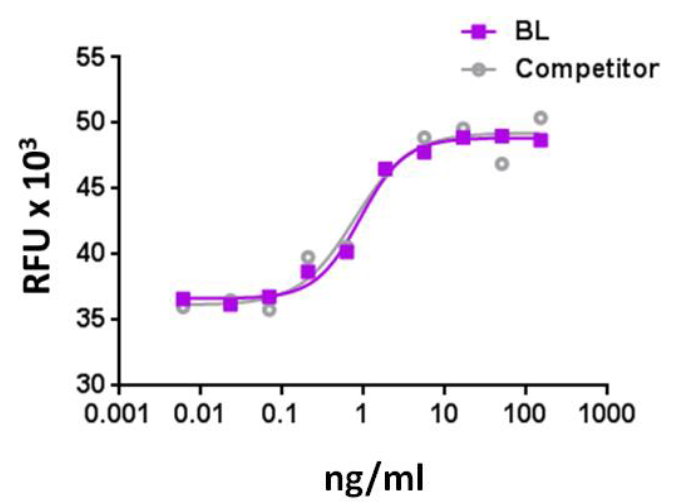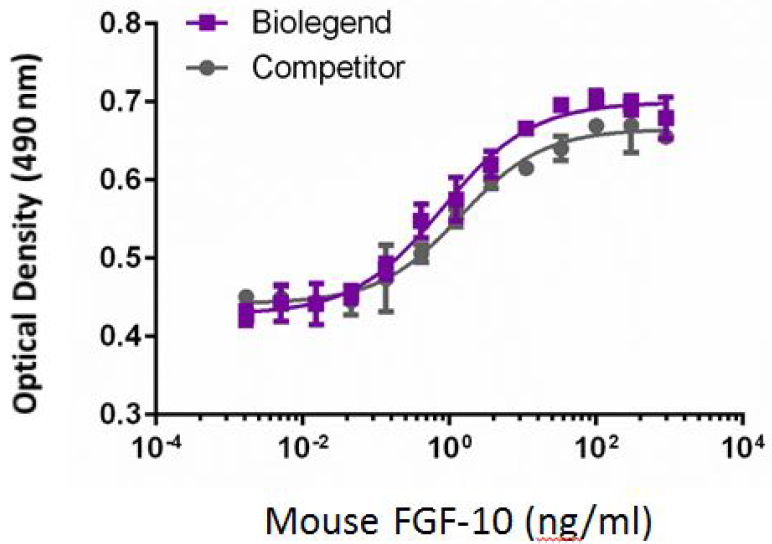- Regulatory Status
- RUO
- Other Names
- Fibroblast growth factor 2 (FGF-2), Fgfb, bFGF
- Ave. Rating
- Submit a Review
- Product Citations
- publications
| Cat # | Size | Price | Quantity Check Availability | Save | ||
|---|---|---|---|---|---|---|
| 713204 | 50 µg | 203€ | ||||
This product is not available for shipping outside of the United States.
Select size of product is eligible for a 40% discount! Promotion valid until December 31, 2024. Exclusions apply. To view full promotion terms and conditions or to contact your local BioLegend representative to receive a quote, visit our webpage.
FGF-basic, also known as FGFb and FGF-2, is a member of the fibroblast growth factor (FGF) family which includes 23 members. FGFb is expressed in almost all tissues and plays an important role in a variety of normal and pathological processes, including development, wound healing, and neoplastic transformation. FGFb is mitogenic for many cell types, both epithelial and mesenchymal. FGFb shows potent angiogenic activity and has been implicated in tumor angiogenesis. FGFb significantly promoted the proliferation of adipose-derived mesenchymal cells (AMC) and enhanced chondrogenesis in three-dimensional micromass culture. FGFb binds to a family of four distinct, high affinity tyrosine kinase receptors, designated FGFR-1 to -4. In addition, FGFb binds to the extracellular matrix, and heparan sulfate (HS) is an essential and dynamic regulator of fibroblast growth factor (FGF) signaling. Two fundamentally different crystallographic models have been proposed to explain, at the molecular level, how HS/heparin enables FGF and FGF receptor (FGFR) to assemble into a functional dimer on the cell surface, although there is controversy regarding the exact manner by which this occurs.
Product DetailsProduct Details
- Source
- Mouse FGF-basic, amino acids Pro10-Ser154 (Accession# NP_032032.1), was expressed in E. coli.
- Molecular Mass
- The 145 amino acid recombinant protein has a predicted molecular mass of approximately 16.3 kD. The predicted N-terminal amino acid is Pro.
- Purity
- >95%, as determined by Coomassie stained SDS-PAGE and HPLC analysis.
- Formulation
- Lyophilized from Tris buffer with NaCl. Carrier-free.
- Endotoxin Level
- Less than 0.1 ng per µg of protein.
- Storage & Handling
- Unopened vial can be stored at -20°C or -70°C. For maximum results, quick spin vial prior to opening. Reconstitute in water to a concentration of 0.1-1.0 mg/ml. Do not vortex. It is recommended to further dilute in a buffer, such as 5% Trehalose, and store working aliquots at -20°C to -80°C. Avoid repeated freeze/thaw cycles.
- Activity
- ED50 ≤ 1.0 ng/ml, corresponding to a specific activity of ≥ 1.0 x 106 units/mg, as determined by a cell proliferation assay using BALB/c 3T3 cells.
- Application
-
Bioassay
Antigen Details
- Structure
- Growth factor
- Distribution
- Brain, retina, pituitary gland, kidney, placenta, testis, corpus luteum, adrenal glands, monocytes, prostate, bone, liver, cartilage, endothelial cells, and epithelial cells.
- Function
- FGF-basic is a potent angiogenic factor, and plays a key role in various physiological and pathological conditions, including embryonic development, wound repair, inflammation, and tumor growth.
- Interaction
- Fibroblasts, myoblasts, osteoblasts, neuronal cells, endothelial cells, keratinocytes, chondrocytes, astrocytes, oligodendrocytes, and smooth muscle.
- Ligand/Receptor
- FGFR-1 (flg), FGFR-2 (bek, K-sam), FGFR3, and FGFR-4 (flg-2), low affinity coreceptor heparin sulfate and heparin sulfate proteoglycans required for full activity.
- Bioactivity
- Stimulation of 3T3 proliferation.
- Cell Type
- Neural Stem Cells, Mesenchymal Stem Cells, Hematopoietic stem and progenitors, Embryonic Stem Cells
- Biology Area
- Cell Biology, Neuroscience, Stem Cells, Synaptic Biology
- Molecular Family
- Growth Factors, Cytokines/Chemokines
- Antigen References
-
1. Rusnati M and Presta M 2007. Current Pharm. Des. 13:2025.
2. Chaffer CL, et al. 2007. Differentiation 75:831.
3. Cronauer NV, et al. 2003. Eur. Urol. 43:309.
4. Shimizu A, et al. 2001. J. Biol. Chem. 276:11031.
5. Mahammadi M, et al. 2005. Curr. Opin. Struct. Biol. 15:506.
6. Chiou M Xu Y Longaker. 2006. MT Biochem. Biophys. Res. Commun. 343:644. - Gene ID
- 14173 View all products for this Gene ID
- UniProt
- View information about FGF-basic on UniProt.org
Related FAQs
- Why choose BioLegend recombinant proteins?
-
• Each lot of product is quality-tested for bioactivity as indicated on the data sheet.
• Greater than 95% Purity or higher, tested on every lot of product.
• 100% Satisfaction Guarantee for quality performance, stability, and consistency.
• Ready-to-use liquid format saves time and reduces challenges associated with reconstitution.
• Bulk and customization available. Contact us.
• Learn more about our Recombinant Proteins. - How does the activity of your recombinant proteins compare to competitors?
-
We quality control each and every lot of recombinant protein. Not only do we check its bioactivity, but we also compare it against other commercially available recombinant proteins. We make sure each recombinant protein’s activity is at least as good as or better than the competition’s. In order to provide you with the best possible product, we ensure that our testing process is rigorous and thorough. If you’re curious and eager to make the switch to BioLegend recombinants, contact your sales representative today!
- What is the specific activity or ED50 of my recombinant protein?
-
The specific activity range of the protein is indicated on the product datasheets. Because the exact activity values on a per unit basis can largely fluctuate depending on a number of factors, including the nature of the assay, cell density, age of cells/passage number, culture media used, and end user technique, the specific activity is best defined as a range and we guarantee the specific activity of all our lots will be within the range indicated on the datasheet. Please note this only applies to recombinants labeled for use in bioassays. ELISA standard recombinant proteins are not recommended for bioassay usage as they are not tested for these applications.
- Have your recombinants been tested for stability?
-
Our testing shows that the recombinant proteins are able to withstand room temperature for a week without losing activity. In addition the recombinant proteins were also found to withstand four cycles of freeze and thaw without losing activity.
- Does specific activity of a recombinant protein vary between lots?
-
Specific activity will vary for each lot and for the type of experiment that is done to validate it, but all passed lots will have activity within the established ED50 range for the product and we guarantee that our products will have lot-to-lot consistency. Please conduct an experiment-specific validation to find the optimal ED50 for your system.
- How do you convert activity as an ED50 in ng/ml to a specific activity in Units/mg?
-
Use formula Specific activity (Units/mg) = 10^6/ ED50 (ng/mL)
 Login / Register
Login / Register 








_Mouse_RECOM_CA_BA_070115.JPG)



Follow Us